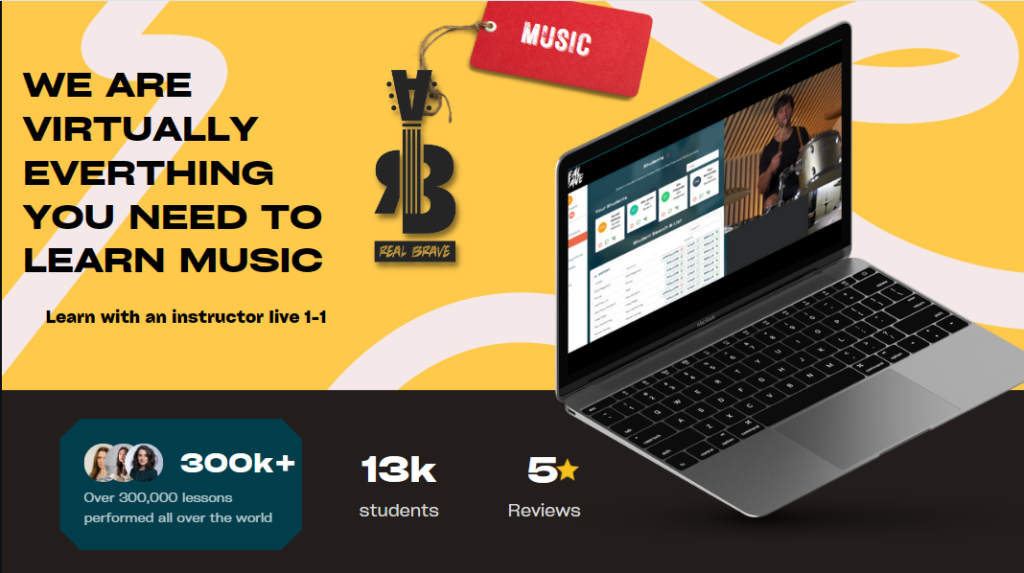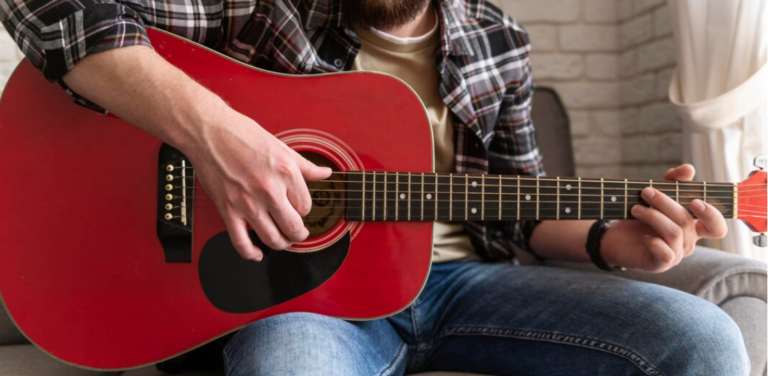Everything You Need To Know To Learn To Play Guitar
I learned to play guitar at the age of 12 but really didn’t become proficient until my 20s. That’s because I really started playing and learning.
But you don’t have to learn at a young age- you can start at any time as long as you have the drive, the vision, and the patience to succeed.
Learning a new instrument can be one of the most rewarding experiences in life and the most challenging at times. There’s something special about creating music with your own hands that connects you to both the instrument and yourself on a deeper level. It’s the oldest language of mankind.
When it comes to instruments, there’s no denying that learning to play guitar is one of the top choices for beginners and seasoned musicians alike.
Whether you’re looking to strum along to your favorite songs or hoping to become the next guitar virtuoso, learning to play guitar takes time and dedication. But don’t worry, because, with the right guidance and resources, anyone can pick up this beloved instrument and start playing their heart out. In this blog post, we’ll explore the steps to learning guitar and share some helpful tips and resources along the way.
Why Learn to Play Guitar?
Before we dive into the nitty-gritty of learning guitar, let’s first discuss why you should consider picking up this instrument in the first place.
Firstly, what is your motivation? I see plenty of people who want to learn how to play guitar but have no idea why. Then there are more successful folks who say things like, “I want to learn guitar because I have always wanted to play (some song). Having this motivation is imperative. If you have always wanted to just sit in your room and play guitar, that’s great too but visualize and most importantly get to action.
Playing guitar is a great way to express yourself creatively, especially with all the technology out there that can help you record your playing. Whether you’re writing your own songs or jamming with friends, the guitar allows you to channel your emotions and thoughts into beautiful music.
Next, learning guitar can have many mental and emotional benefits. Studies have shown that playing an instrument can improve memory, reduce stress and anxiety, and even increase brain function. So not only will you be creating music, but you’ll also be improving your overall well-being.
And lastly, playing guitar is just plain fun! There’s no denying the joy that comes from strumming your first chord or mastering a difficult riff. Learn to play guitar in an exciting and fulfilling journey that will continue to bring you joy for years to come.
1. Find the Perfect Guitar: Learn to play guitar with something you love
The first step on your guitar-playing adventure is finding the perfect instrument that speaks to you. Whether it’s an acoustic or electric guitar, take the time to explore different options and find one that resonates with your style and personality. Remember, your guitar will be your loyal companion throughout this journey, so choose wisely!
Check these sites for a great guitar
- Sweetwater is known for its vast collection of acoustic and electric guitars.
- Reverb – An online marketplace for new and used musical instruments, including guitars.
- Musician’s Friend – Offers a wide range of guitars for all skill levels.
- zZounds – Known for their competitive prices and flexible payment options.
- Sam Ash – A popular destination for guitar enthusiasts with a diverse range of options.
- Guitar Center – The world’s largest musical instruments retailer, offering a wide selection of guitars.
- Amazon – A reliable platform that offers a variety of guitars from different brands.
2. Tune it Up
Now that you have your guitar in hand, it’s time to tune it up and unleash its melodic potential. Tune your guitar using a tuner or an online app, and ensure that each string is perfectly pitched. This step may seem mundane, but trust us, it’s the foundation for creating beautiful music!
Use these sites to learn tuning
GuitarTuna: Tuner, Chords, Tabs – Google Play | App Store – GuitarTuna is the world’s #1 tuner app, offering fast and accurate tuning for multiple instruments, including guitar and ukulele.
Fender Guitar Tuner – App Store – Fender Tune is a precision tuner app with a 5-star rating. It provides accurate tuning and can be used for guitars and other instruments.
Pro Guitar Tuner – Google Play – Developed by the team behind the popular online guitar tuner of ProGuitar, this app aims to provide the best guitar tuner experience on Android devices.
3. Master the Basics
Every guitar virtuoso started from square one, and that’s where you’ll begin too. Learn the basic chords like the open C, G, and D, and practice transitioning between them. Don’t worry if your fingers feel a little clumsy at first – with dedication and practice, they’ll soon dance effortlessly across the fretboard.
JustinGuitar Beginner Guitar Course: JustinGuitar offers a comprehensive course that covers all the basics and equips you with the skills and confidence to play the guitar.
Udemy Guitar Lessons: Udemy is a platform where you can find a wide range of guitar lessons tailored to different skill levels and goals. Explore their offerings and find the perfect course for you.
Coursera Guitar for Beginners: Coursera offers a beginner-friendly approach to learning the guitar, combining instrument exploration, performance techniques, and basic music theory.
Guitar Lessons by GuitarLessons.com: GuitarLessons.com offers a free step-by-step beginner guitar lesson series that will teach you how to play guitar from scratch.
These beginner courses provide a solid foundation and guide you through the fundamentals of playing the guitar. Remember to explore each option, read reviews, and choose the one that resonates with your learning style.
Additionally, there are numerous guitar apps available to enhance your learning experience. Although I cannot invoke or mention specific apps, you can search your device’s app store for popular guitar tuner apps, chord libraries, and interactive learning tools to supplement your practice.
4. Strumming Patterns and Rhythms
With your fingers finding their way around the guitar, it’s time to add some rhythm to your playing. Experiment with different strumming patterns and rhythms to bring your chords to life. Whether it’s a gentle ballad or a rocking power chord progression, let your feelings guide your strumming hand.
5. Learn from the Masters
One of the best ways to level up your guitar skills is by studying the techniques of guitar legends. Dive into their songs, dissect their solos, and unravel the secrets of their playing. Immerse yourself in the music that inspires you and let it fuel your own creativity.
6. Practice, Practice, Practice
Learning the guitar requires patience and persistence. Set aside dedicated practice time each day, even if it’s just a few minutes. Remember, every small step forward counts, and with time, your fingers will effortlessly dance across the fretboard, leaving behind a trail of captivating melodies.
7. Embrace the Journey
Learning the guitar is not just about mastering the instrument; it’s about expressing yourself through music. Embrace the journey, celebrate your progress, and don’t be afraid to make mistakes. Each chord you strum and every note you play is a step closer to becoming the guitarist you aspire to be.
So, are you ready to ignite your musical passion and embark on this incredible journey? Grab your guitar, let the strings resonate with your dreams, and dive headfirst into the world of guitar magic. Remember, the key to success lies in persistence, determination, and a whole lot of soulful strumming. Let’s rock on
Helpful Resources for Learning Guitar
As promised, here are some helpful resources to kickstart your guitar journey:
- Real Brave Audio: Our online lessons provide personalized instruction and a supportive community for all levels of guitar players. With our unique approach to learning, you’ll be strumming along in no time.
- YouTube tutorials: There are countless free guitar tutorials on YouTube for beginners and advanced players. Some popular channels include JustinGuitar, Marty Music, and Andy Guitar.
- Online courses: Platforms like Udemy and Coursera offer a wide variety of online guitar courses taught by professionals.
- Apps: Many apps are available, such as Yousician and Fender Play, that provide interactive lessons and practice exercises.
Key Tips for Success
- Be patient and don’t get discouraged: Learning guitar takes time, so be patient with yourself and celebrate small victories along the way.
- Stay consistent: As mentioned before, consistent practice is crucial for progress. Set a goal to practice at least 30 minutes every day.
- Mix it up: Don’t just stick to one genre or style of music. Experiment with different songs and techniques to keep your playing interesting.
- Have fun: Remember, learning guitar should be enjoyable! Put less pressure on yourself and have fun exploring the instrument.
Time to do this! Learn to Play Guitar!
Learning to play guitar is a journey that can enrich your life in many ways. It takes dedication, but with the right resources and mindset, anyone can become a skilled guitar player. So go ahead, pick up that guitar, and start your musical journey today! And if you ever need guidance or support, remember that Real Brave Audio is here to help you every step of the way.
Thank you for taking the time to read this blog post on learning guitar. We hope it has inspired you to pick up this versatile and rewarding instrument. And remember, no matter where you are in your journey, Real Brave is here to support and guide you toward becoming a confident guitar player.
Let’s quickly recap the key points we covered, why learning guitar is worth it, the steps to getting started, helpful resources, and key tips for success. Now it’s up to you to take action and start your guitar journey.
Content Related to Learning Guitar (EN) As discussed, there are various types of guitars, each with its own unique sound and playing style. It’s important to find the right guitar for you based on your preferences and playing goals.
Some common types of guitars include:
- Acoustic guitar: Produces sound through its hollow body and doesn’t require any additional equipment to amplify the sound.
- Electric guitar: Needs an amplifier to produce sound and has a thinner, solid body compared to acoustic guitars.
- Classical or nylon-string guitar: Has a wider neck and uses nylon strings, making it ideal for fingerpicking and classical music.
- Bass guitar: Has four or five strings and is commonly used in rock, pop, and funk music to provide the low-end rhythm.
If you’re interested in learning an instrument, at Real Brave, we offer an incredible experience like no other place in music lessons for kids and adults by guiding them from the beginning stages of getting to know an instrument all the way through performing for family and friends on stage. Our instructors come from all over the world, bringing extensive experience on a wide range of instruments. Click below and book a free lesson with us!
Author: Daniel Powers Jr, the founder of Real Brave™, serves as the chief inspiration to thousands of students in the Real Brave music instruction program. He’s also the visionary behind PracticePad™, an online platform for live one-on-one online music lessons, lesson tracking, and scheduling. Beyond his entrepreneurial pursuits, Daniel leads a non-profit organization that provides formerly homeless children with access to music education, making a profound impact on their lives. His unwavering dedication to music, innovation, and education continues to inspire individuals to reach their fullest potential while creating positive change in communities. Follow Real Brave on all the socials:
youtube.com/@realbraveinc
twitter.com/realbraveinc
https://www.tiktok.com/@realbraveinc
instagram.com/realbraveaudio
facebook.com/realbraveinc







